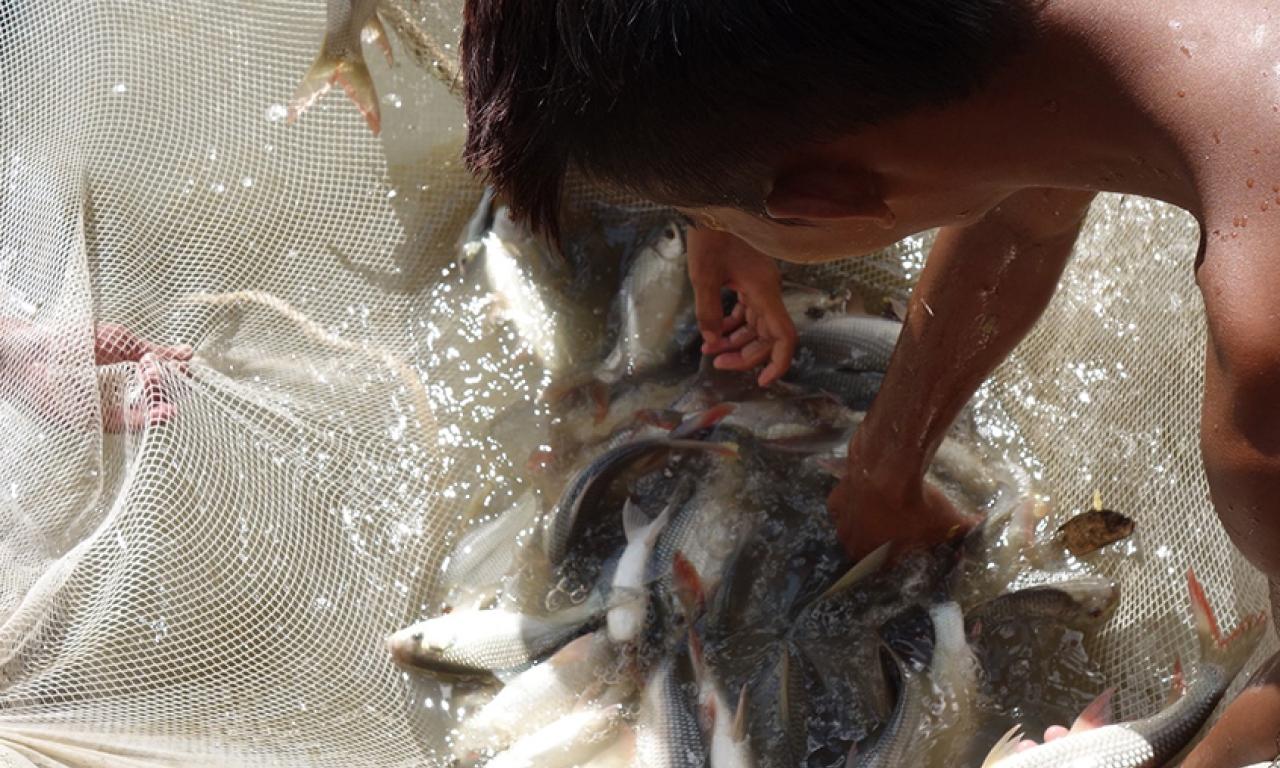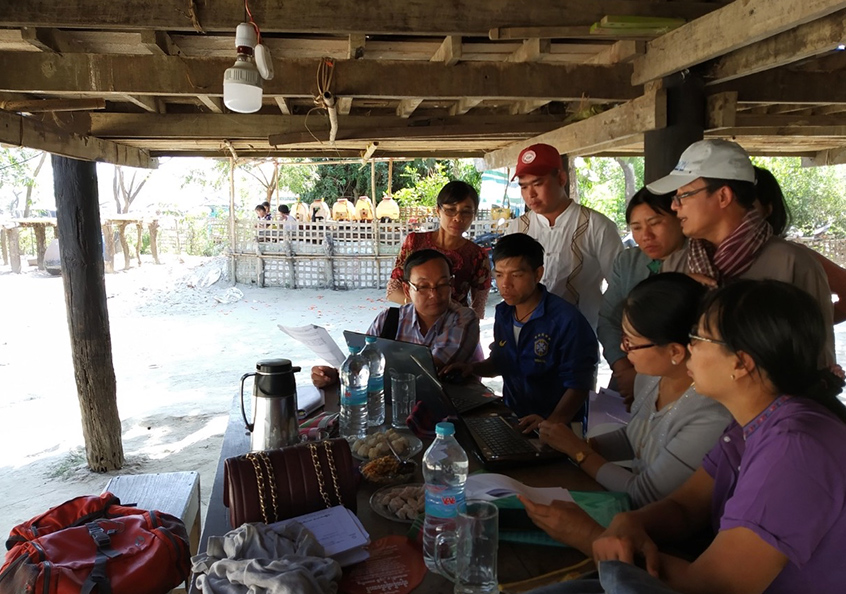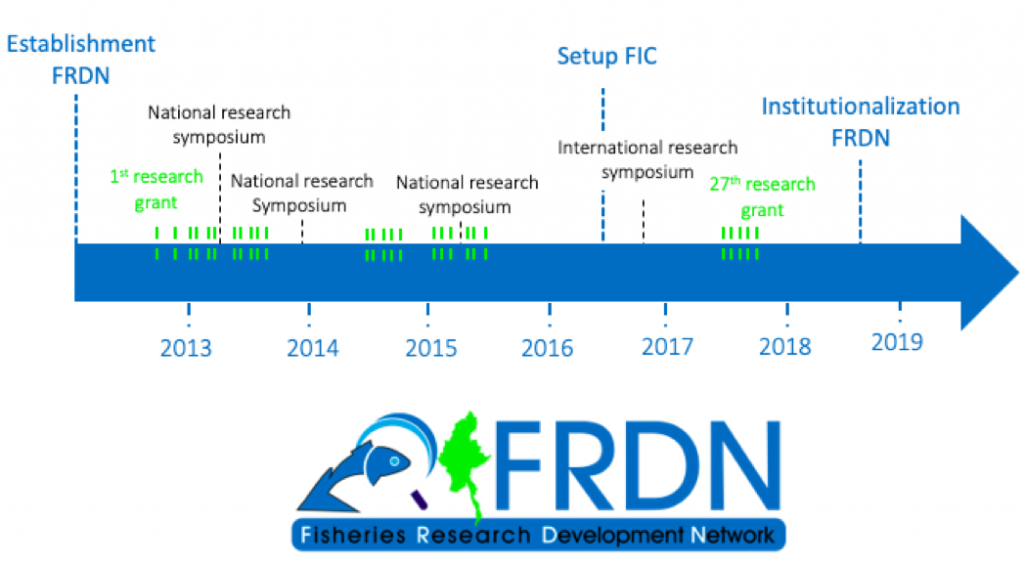
With most of its population residing in coastal areas and within the mega Delta of the Ayeyarwady River, Myanmar depends on its fisheries as a critical source of food, employment, and revenue.
Need for improved fisheries research
With most of its population residing in coastal areas and within the mega Delta of the Ayeyarwady River, Myanmar depends on its fisheries as a critical source of food, employment, and revenue. The country notably ranks among the top 10 global fish producers. Beyond productivity figures, which have been increasingly questioned, Myanmar encompasses a broad range of aquatic systems, impressive fish biodiversity, and a correspondingly rich cultural diversity. Yet much of that wealth remains either undocumented or not easily accessible.
With one of the lowest academic capacity standings in the region, Myanmar universities are facing a difficult task to redress the balance. They currently do not have dedicated fisheries or aquaculture curriculum. While zoology departments do address these subjects, the focus is often limited to basic fish anatomy and taxonomy with very little exchange of information taking place amongst peers. In the context of growing interest in Myanmar’s aquatic resources, the country is potentially at a crossroads in terms of coordinating fisheries and aquaculture research efforts.
Establishing a collaborative research platform
Initiated in 2012, the ACIAR-funded “Improving Research and Development of Myanmar’s Inland and Coastal Fisheries” project was co-implemented by WorldFish and the Department of Fisheries (DoF). The project initiated a researcher-to-researcher network to spearhead research efforts. The Fisheries Research Development Network (FRDN) was established between local Universities, the Department of Fisheries, and the private sector with the ambitious objective to improve local research capacity and bolster cohesive and coordinated research efforts around Myanmar fisheries and aquaculture.
From 2012 to date, the FRDN has channeled over US$ 200,000 in the form of mini-research grants to support local institutions to implement research in the sector. In addition, the FRDN has supported the organization of unique annual research symposia, bringing together academics, government staff, researchers and local fishing communities to facilitate knowledge sharing and conjointly identify critical research gaps in the sector.

The research areas are very broad, ranging from livelihood, aquaculture, value chain, and biodiversity assessments. More recently, the FRDN has been supporting a unique research framework between universities and the DoF to monitor the outcomes of community-based fisheries management initiatives.
“The FRDN provides a good exposure to universities, especially for those that have little practical experience with actual fieldwork. The experience gained in data collection, data entry, and analysis is invaluable for students and sometimes even senior researchers. Very often, our technical support is delivered with assistance from international experts but the ultimate objective is always to build capacity so that our partners can conduct their own research independently.”
- Hsu Mon Aung, FRDN Coordinator
Taking advantage of digital technologies
At a time where digital technology increasingly brings information at our fingertips, there is much potential for leveraging these tools to improve fisheries and aquaculture research in Myanmar. Under the wing of the FRDN, the Fisheries Information Center (FIC) is complementing FRDN efforts. To make the best of existing information and to improve access to these resources, the FIC is set to act as a central hub for the documentation of fisheries and aquaculture research in Myanmar. Physically located within the DoF, the database encompasses research papers, project reports, informative posters, training books sourced from various fronts. Technically supported by WorldFish, the FIC builds on a larger initiative from the Ministry of Higher Education to improve access of Myanmar students to research. The FIC is also collaborating with the Access to Global Online Research in Agriculture (AGORA) coordinated by FAO, to offer Myanmar students with free access to an outstanding digital collection (up to 13,700 key journals!) in the fields of food, agriculture, environmental science, and related social sciences.
In the near future, the FIC is planning to host seminars and workshops to nurture a culture of knowledge exchange and to facilitate discussions around the latest research publications of interest.
“FIC is not only benefitting local academics but a wide range of people that work in the fisheries sector. Government staff capacity notably can make effective use of our database and integrate the knowledge into their fieldwork. The whole initiative relies on contributions from various users so the more we are growing, the more there is to gain from this research hub”
– Waing Hmein, DoF staff member/FIC Chief Librarian
Ambitious future
Back in 2018, the FRDN was institutionalized through a Memorandum of Understanding (MoU). It is now fully administered by the DoF and overseen by a management committee involving Myanmar universities and the private sector with the technical support of WorldFish. After 7 years of very much needed research efforts, the network has the ambition to keep supporting researchers sharing knowledge and fostering new collaborations to support the co-documentation of fisheries and aquaculture research in Myanmar. In doing so, the FRDN and the FIC are laying the foundation of a vibrant research community around fisheries and aquaculture in Myanmar. It is hoped that these efforts will, in turn, support better management of Myanmar fish resources and enable the articulation of targeted development efforts towards sustained productivity and equitable benefits to those who depend on this critical resource.

About the authors

Thadoe (Wai) is working as a research assistant with WorldFish in Myanmar since August 2018. He grew up in Yangon and studied in Canada for six years, where he graduated with a B.Sc. in Environmental Science from Simon Fraser University where he specialized in Water Science. He has keen interest in aquaria and urban ecosystem restoration, and is driven by an aspiration to preserve aquatic flora and fauna of Myanmar.

Xavier Tezzo is an agro-economist with over ten years of international experience in the field of fisheries and aquaculture. Originally from Belgium and Congo, he has previously lived and worked in Africa and Southeast Asia. Living in Myanmar for over 6 years, Xavier currently works as a program coordinator for WorldFish, coordinating research activities across various projects. Concurrently undertaking a social sciences PhD project with Wageningen University, his research focuses on the aquaculture transitions in Myanmar.